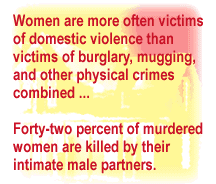

By Nancy M. Erikson
United Church of Christ News
Women today are more likely to report incidents of battering than in the
past, but there is still much to be done to make domestic violence a
community concern rather than a private issue. And people of faith can help
make that happen, says the Rev. Marie Fortune, Executive Director of the
Center for the Prevention of Sexual and Domestic Violence in Seattle.

"Ultimately, that is the thing that will make the difference: when every part of the community; churches, law enforcement, employers; responds and holds batterers accountable for what they're doing," said Fortune.
Consider these statistics from the Family Violence Prevention Fund in San Francisco:
A September 1994 story in Ms.Magazine reported that domestic violence causes almost 100,000 days of hospitalization, 30,000 emergency room visits and 40,000 trips to the doctor every year.
If all the women victimized by domestic violence in 1993 joined hands, said the article, the line would stretch from New York City to Los Angeles and beyond.
Religion can be either a barrier or a support in dealing with domestic violence, depending on the attitude toward men and women, says Bobbi Wells Hargleroad, Minister of Mission at First United Church of Oak Park (Ill.)
Hargleroad trains telephone volunteers for Sarah's Inn, a community program that helps connect battered women to emergency services and housing. She says the women who call for help come from many faith traditions, but that sometimes, Christian teaching can confuse the issue.
For example, she says, some clergy take Paul's words in his letter to the Ephesians out of context; "Wives submit to your husbands as to the Lord" (Eph. 5:22). But they rarely quote Paul's letter further: "Men ought to love their wives just as they love their own bodies."
Similarly, "women will say, 'I promised to love, honor and obey. This is just my cross to bear. I love this man. I promised to live with him,'" says Hargleroad. "There are just a whole bunch of things that come out of old recordings of what religion is about."
Another problem is that women are not always believed, she says. "We feel we can't go to what should be the most powerful force in times of crisis," says Hargleroad. "Women can't assume their pastors will believe them or know how to deal with the situation."
What can a congregation do? Hargleroad suggests these options:
What can a pastor do?
Here are some ideas adapted from "Shattered and Broken, Wife Abuse in the Christian Community: Guidelines for Hope and Healing," S.R. McDill and Linda McDill, S.H. Revell, 1991.
Individual lay people can also make meaningful contributions to ending
domestic violence. The late Kathleen R. Carlin was one such individual.
Among her many accomplishments, this UCC layperson co-founded and chaired
the National Woman Abuse Prevention Project. She was Executive Director of Men Stopping Violence from 1982 until her death on Sept. 20.
|
See Also These Other Domestic Violence Cover Stories:
|
[ Return to News Archives || Return to News ]
Copyright © 1998 Kaleidoscope Ministries Ltd. All rights reserved.